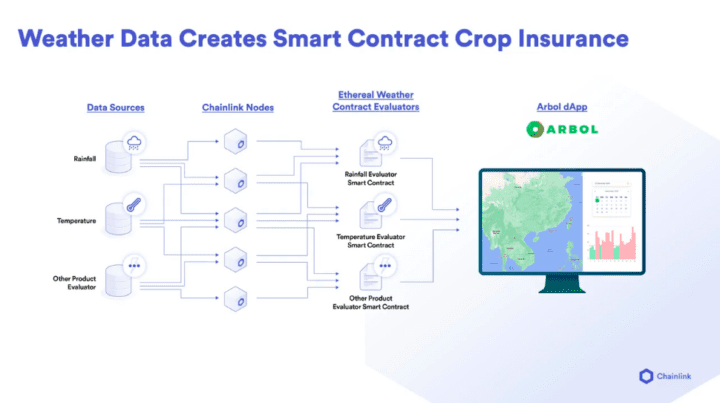At CoinDesk’s 2021 Consensus virtual conference, attended by more than 10,000 cryptocurrency and blockchain professionals from around the world, Chainlink Co-Founder Sergey Nazarov spoke about how hybrid smart contracts, as outlined in the Chainlink 2.0 whitepaper, can deliver an “immeasurably positive impact” on society – specifically when it comes to mitigating the potentially disastrous consequences of climate change.
Nazarov outlined what he sees as two important, “underappreciated” hybrid smart contract applications that are already being deployed to combat environmental catastrophes: decentralized parametric insurance and more advanced carbon credits.
How Parametric Insurance Mitigates Risk In Emerging Markets
Nazarov explained that weather pattern disruptions caused by climate change disproportionately impact economies and workers in developing regions of the world, where it’s difficult, if not impossible, to obtain adequate insurance from centralized providers.
He said one way to “soften” the impact of environmental events that destroy people’s livelihoods is global access to decentralized financial products, such as Arbol’s parametric insurance, which leverages weather data obtained by Chainlink’s decentralized oracle networks (DONs) to trigger direct payouts via hybrid smart contracts underwritten by AI.
Decentralized insurance products allow anyone around the world to obtain protection, independent of whether or not centralized insurance providers extend coverage to their local geography. No matter where someone is located, “the contract will be available to them,” Nazarov said.

How Hybrid Smart Contracts Incentivize Regenerative Agriculture
“Fundamentally, blockchains are very good at creating proof and incentives,” Nazarov said.
“With the addition of oracles to blockchains, we’re able to prove things that are meaningful about environmental outcomes. And once you prove those environmental outcomes, then you can layer on the incentives and the transparency and the truth-generation of smart contracts into the world of carbon sequestration, reforestation, carbon tax credits and so on.”
Last week, Chainlink awarded a Chainlink Community Grant to help fund Green World Campaign’s hybrid smart contract application, AIRS, which uses satellite data to automatically dispense financial rewards for successful regenerative agriculture efforts that boost biodiversity and reduce atmospheric CO₂.
“I think that global carbon tax credit system will probably end up running on a blockchain and reforestation initiatives like AIRS and others are already underway in making their own hybrid smart contracts reliably trigger various critical outcomes,” Nazarov said.

Ultimately, he believes hybrid smart contracts create a global market for interaction between regenerative agriculture initiatives and capital markets.
“I think, at the end of the day, you have a truly amazing ability to make DeFi as a market function, which creates a market for NFTs; it creates a market for yield; it creates a market for a huge number of different assets and outcomes.”
Most importantly, Nazarov argued, hybrid smart contracts create a market for critical societal outcomes. “I think this is an underappreciated factor for how smart contracts and blockchains will actually come to completely change how the environment is approached from an incentives point of view.”
Watch Sergey Nazarov’s full presentation at the 2021 Consensus virtual conference.
Elizabeth Licorish is a writer and author whose work has appeared in HuffPost, PhillyVoice and Bustle. In 2008, she wrote and co-authored Innovation for Underdogs. In 2010, she wrote and edited Charles Manson Now. She received her MFA in creative nonfiction from Rutgers University and has ghostwritten hundreds of executive thought leadership pieces for some of the world’s leading experts across diverse industries. She has been writing and editing for influential blockchain projects since 2017, when she fell in love with decentralized finance’s potential to empower individuals in an economically just world. As the editor-in-chief of Chainlink Today, she’s passionate about telling the human stories behind some of the most promising technology in the fastest-growing blockchain ecosystem.


